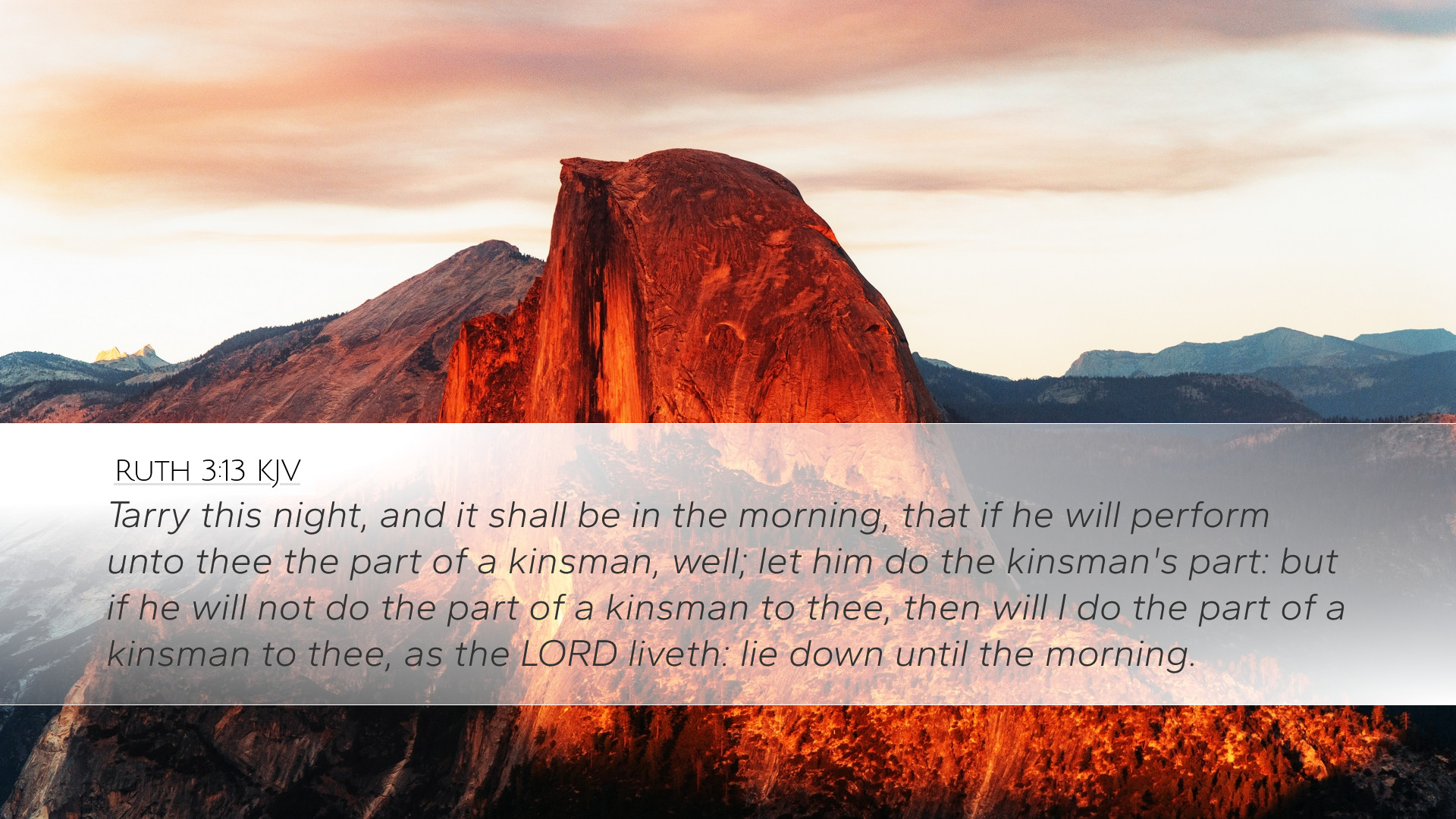Old Testament
Genesis Exodus Leviticus Numbers Deuteronomy Joshua Judges Ruth 1 Samuel 2 Samuel 1 Kings 2 Kings 1 Chronicles 2 Chronicles Ezra Nehemiah Esther Job Psalms Proverbs Ecclesiastes Song of Solomon Isaiah Jeremiah Lamentations Ezekiel Daniel Hosea Joel Amos Obadiah Jonah Micah Nahum Habakkuk Zephaniah Haggai Zechariah MalachiRuth 3:13
Ruth 3:13 KJV
Tarry this night, and it shall be in the morning, that if he will perform unto thee the part of a kinsman, well; let him do the kinsman's part: but if he will not do the part of a kinsman to thee, then will I do the part of a kinsman to thee, as the LORD liveth: lie down until the morning.
Ruth 3:13 Bible Commentary
Commentary on Ruth 3:13
Ruth 3:13 states: "Stay this night, and it shall be in the morning, that if he will perform unto thee the part of a kinsman, well; let him do the kinsman's part: but if he will not perform the part of a kinsman to thee, then will I perform the part of a kinsman to thee, as the Lord liveth: lie down until the morning."
Contextual Background
The book of Ruth is a narrative that unfolds during the time of the judges in Israel, highlighting themes of loyalty, redemption, and divine providence. The particular episode found in Ruth 3:13 brings the narrative to a critical moment where Ruth makes a bold move in her relationship with Boaz. This verse encapsulates the significance of Levirate marriage and the role of the kinsman-redeemer within the Israelite community.
Detailed Analysis
- Boaz as the Kinsman-Redeemer:
In this passage, Boaz acknowledges his responsibilities as the kinsman-redeemer. Matthew Henry emphasizes the importance of this role in preserving the lineage and inheritance of Elimelech’s family. His willingness to act reflects a commitment not merely to legal obligations but also to familial ties.
- Conditional Assurance:
Boaz establishes a condition with Ruth, showing a sense of propriety and responsibility. Adam Clarke notes that it is essential for the kinsman to willingly accept the role; thus, the mention of “if he will perform” highlights the voluntary aspect of this duty.
- Submission and Trust:
Ruth is instructed to lie down until morning, demonstrating her trust in Boaz’s integrity. Albert Barnes draws attention to Ruth’s submission, portraying it as an act of faith, as she awaits the outcome of Boaz’s decision, embodying hope and patience.
- Divine Swearing:
When Boaz invokes the name of the Lord, "as the Lord liveth," it underscores the seriousness of his promise. This alludes to the sacred nature of Oaths in Israelite culture as interpreted by Matthew Henry, providing a profound assurance of Boaz’s commitment to act righteously.
Theological Implications
This verse serves as a rich source for theological reflection, particularly regarding God's providence. Ruth’s situation, fraught with vulnerability, is transformed into a narrative of redemption that God orchestrates. The interplay between human initiative and divine providence invites discussions on trusting God's plan in uncertain circumstances.
1. The Role of Providence
Commentators like Clarke articulate that Ruth’s actions are not mere coincidence but rather a part of God's providential plan. The unfolding of events illustrates how God uses ordinary decisions to fulfill His greater purposes.
2. The Kinsman-Redeemer as a Christological Foreshadowing
In a Christological light, Boaz functions as a type of Christ, the ultimate Kinsman-Redeemer. His willingness to take on the responsibility on behalf of Ruth mirrors Christ’s sacrificial love and commitment to redeem humanity.
Practical Applications for Ministry
The teachings in Ruth 3:13 prompt believers to explore the nuances of relationships within the community of faith. Pastors and theologians can draw from this narrative to illustrate the nature of commitment and service to one another.
1. Foster Loyalty and Commitment
Like Ruth’s loyalty to Naomi, congregants are encouraged to cultivate a spirit of loyalty and care for one another. Strong community bonds can be emphasized in sermons, reflecting the loving commitment that is necessary for a healthy church body.
2. Highlighting the Importance of Integrity
Boaz’s integrity provides a model for leadership within the church. The commitment to righteousness and adherence to one’s promises is an important principle for all who serve in ministry.
3. Encouraging Trust in God’s Plan
In moments of uncertainty, congregants are reminded to trust in God’s provision. Like Ruth, they must remain hopeful and patient, trusting in God’s sovereign control over their lives.
Conclusion
The narrative captured in Ruth 3:13, rich with cultural nuances and profound theological insights, serves both as a model for individual behavior and a reflection of God's redemptive work. Through the lens of various public domain commentaries, the importance of commitment, integrity, and divine providence emerges, providing valuable lessons for pastors, theologians, and all believers. The story of Ruth and Boaz ultimately points to the greater narrative of redemption found in Christ, eliciting a hopeful response for those seeking understanding and application in their daily lives.


